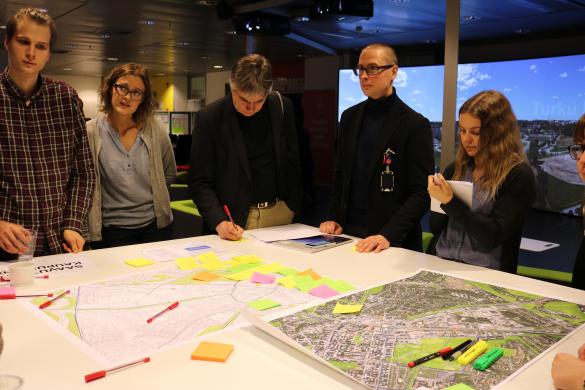Finland
City of Turku
Since 2016
The Turku Future Forums are open sessions lasting 3 to 4 hours in which the central themes of city development are addressed: mobility, livability and urban life.
The Turku Future Forum was initially designed to engage citizens in strategic and long-term vision processes that aimed at developing the city in terms of competitiveness, attraction, well-being and sustainability.
The main goals of the Forum when it was created in late 2016 were:
- Collect ideas and nurture global visions of city development
- Mix different actors and points of view in the "sense-making sessions"
- Provide an open forum for direct participation
- Obtain consensus for development ideas
"What will the area between Yliopistonmäki, Kupittaa and Itäharju be like in the 2030s? What services and companies should there be in the area and what will the campus of the future be like? How will the area develop into a more dynamic and attractive one, and what kind of buildings should be built there? And how should traffic and mobility in the area be organized in the future? Answers to these and many other questions will be sought during the Turku Future Forum Ideas Week which will be held from 28 November to 1 December 2016. The city invites all those interested in the development of the Turku campus and science park to participate. ".
With this message, in 2016, the municipality of Turku invited all those who had an interest in doing so to take part in the initiative. Starting in 2016, the year of its launch, Turku Future Forum has become a well-known project among the various actors of the city: residents, entrepreneurs, real estate investors, academics and cultural actors.
Eventually the number of participants exceeded 200 in the first edition and, in May 2018, not even two years after the initiative was born, the city council decided to make Turku Future Forums a permanent method for regular and structured involvement. of residents and other stakeholders in the strategic development of the city.
Depending on the topic of the Forum, different partners participated in designing the content of the sessions and facilitating the workshops. For example, the Forum focusing on developing the city as the best place to study in Finland was designed in close cooperation with universities and the Study in Turku consortium. In designing the workshop focusing on the attractiveness of the Science Park area from a commercial point of view, they worked closely with the regional development company, Turku Science Park Ltd. Furthermore, in order to attract mainly students and business people to develop solutions that would increase the liveliness and attractiveness of the Science Park area, they also organized a hackathon (Turku Future Hack). The weekend-long hackathon was designed together with Elisa Ltd (a major network operator in Finland), Turku Science Park Ltd and Turku Technology Properties Ltd.
Turku is a city of less than 200,000 inhabitants located on the southwestern coast of Finland. It is known for the Aura River, which runs through it, Turku Castle, a medieval fortress, the Cathedral which houses a royal tomb and, starting from 2016, also for the Turku Future Forums, open and interactive sessions in which they are discussed the main themes for the development of the city such as mobility, livability of the city area and urban life. The sessions in question consist of two parts: the first part includes introductions by experts such as city officials, architects, businessmen, politicians or even academics who offer different perspectives on the subject matter; the second part of the session, on the other hand, is organized as an interactive laboratory in which the participants are divided into groups according to the themes on which they have concentrated more in the general session and face them by elaborating concrete proposals.

For example, a Future Forum organized on the theme of the cultural and historical attractiveness of the city center envisaged a workshop on three themes: 1) public space as a platform for urban culture; 2) rebirth of the historic center; and 3) the marine Turku. In the workshop, participants were asked to discuss concrete ideas and actions on these issues to strengthen the attractiveness of the city for both tourists and visitors, but also for the local population. In the workshops, there were different facilitation methods, such as the wheel of the future and the world cafe, to support and structure the interaction. All workshop ideas were collected and reported to the participants as well as to the vision groups who used them as input to produce the visions. The results were also released as a blog post on the city's official website.
Not only were the Forums held in person, but ideas and feedback were also collected through other means such as, for example, digital channels.
Sources